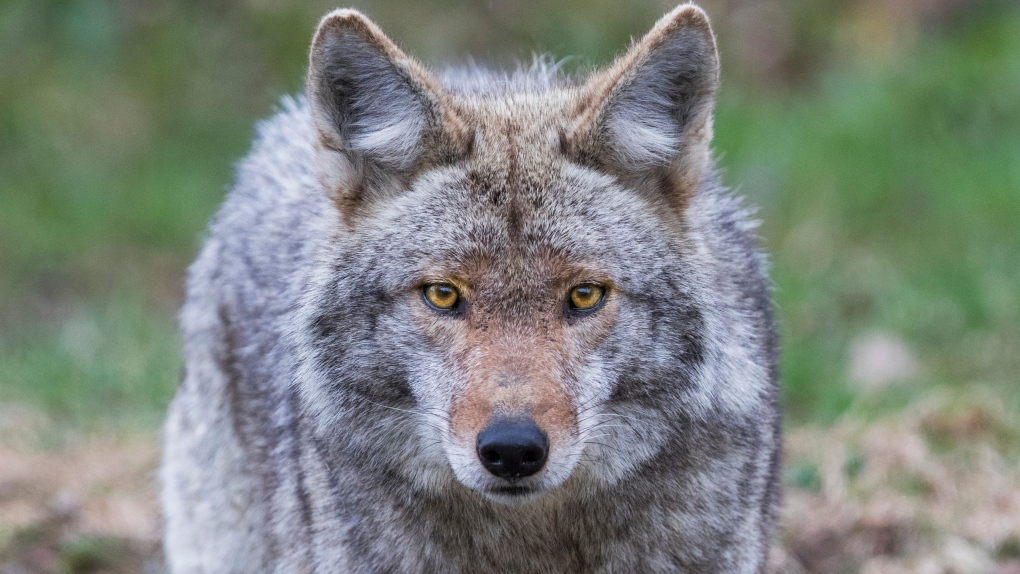Trail closures possible in Stanley Park during coyote breeding, denning season
 File photo from shutterstock.com.
File photo from shutterstock.com.
Officials are warning people in Vancouver to keep an eye out for coyotes in the coming weeks as breeding and denning season could make the animals more active and defensive.
In a public notice issued Tuesday, the city's park board said coyotes begin breeding in January, with new litters emerging this time of year.
"During this period coyotes become more active as they establish dens, guard their territories, and gather extra food for their pups," the park board's advisory said. "Coyotes usually appear at dawn and dusk, but currently they are more visible during the day as they become more assertive to protect their young. This could look like guiding humans and pets away from their dens and adopting a more defensive stance when feeling threatened."
As coyotes often retreat to forested, secluded spots for their dens, the park board warned certain busy trails – including some in Stanley Park – may have restricted access to avoid disturbing the animals.
In past years, full closures of the park have been necessary. In 2021, between August and December, dozens of people were reportedly attacked by coyotes in Stanley Park. As a result, 11 of the animals were trapped and killed. Officials say it was likely the aggressive coyotes had became food habituated, which led them to take that extreme action of closing all of Stanley Park.
"The unprecedented string of attacks impacted public safety, led to widespread community concern, closures of the park and financial impacts to businesses," the B.C. Conservation Officer said in a social media post earlier this year.
Vancouver's not the only municipality that has been impacted by aggressive coyotes. Last September, seven coyote attacks were reported in a 24-hour period in Mission.
And, last May, a six-year-old girl was bitten by a coyote at a music festival in Burnaby.
In an effort to reduce the number of negative interactions between people and coyotes, the park board is urging people not to leave food on the ground and to never offer food to wildlife.
"Food attractants are the main reason coyotes becoming habituated to humans and hugely increase the chances of conflict," the park board's notice said, adding fines of $500 can be handed out to anyone caught feeding wildlife.
Pets should be kept on leash, except in designated off-leash areas. Anyone who encounters a coyote should slowly back away. If the animal approaches, the park board recommends acting aggressively by standing tall and yelling.
Correction
A previous version of this story suggested Stanley Park was closed in 2021 because of denning season. The story has been updated to reflect the coyotes' behaviour was likely due to food habituation, according to park board officials.
CTVNews.ca Top Stories

Back on air: John Vennavally-Rao on reclaiming his career while living with cancer
'In February, there was a time when I thought my career as a TV reporter was over,' CTV News reporter and anchor John Vennavally-Rao writes.
The winter solstice is here, the Northern Hemisphere's darkest day
The winter solstice is Saturday, bringing the shortest day and longest night of the year to the Northern Hemisphere — ideal conditions for holiday lights and warm blankets.
Poilievre writes to GG calling for House recall, confidence vote after Singh declares he's ready to bring Liberals down
Conservative Leader Pierre Poilievre has written to Gov. Gen. Mary Simon, imploring her to 'use your authority to inform the prime minister that he must' recall the House of Commons so a non-confidence vote can be held. This move comes in light of NDP Leader Jagmeet Singh publishing a letter stating his caucus 'will vote to bring this government down' sometime in 2025.
School custodian stages surprise for Kitchener, Ont. students ahead of holiday break
He’s no Elf on the Shelf, but maybe closer to Ward of the Board.
Kelly Clarkson's subtle yet satisfying message to anyone single this Christmas
The singer and daytime-talk show host released a fireside video to accompany her 2021 holiday album, “When Christmas Comes Around” that she dubbed, “When Christmas Comes Around…Again.
Judge sentences Quebecer convicted of triple murder who shows 'no remorse'
A Quebecer convicted in a triple murder on Montreal's South Shore has been sentenced to life in prison without chance of parole for 20 years in the second-degree death of Synthia Bussieres.
At least 2 dead, 60 hurt after car drives into German Christmas market in suspected attack
A car plowed into a busy outdoor Christmas market in the eastern German city of Magdeburg on Friday, killing at least two people and injuring at least 60 others in what authorities suspect was an attack.
16-year-old German exchange student dies after North Vancouver crash
A 16-year-old high school student from Germany who was hit by a Jeep in North Vancouver, B.C., last weekend has died in hospital, authorities confirmed.
Poilievre to Trump: 'Canada will never be the 51st state'
Conservative leader Pierre Poilievre is responding to U.S. president-elect Donald Trump’s ongoing suggestions that Canada become the 51st state, saying it will 'never happen.'

































